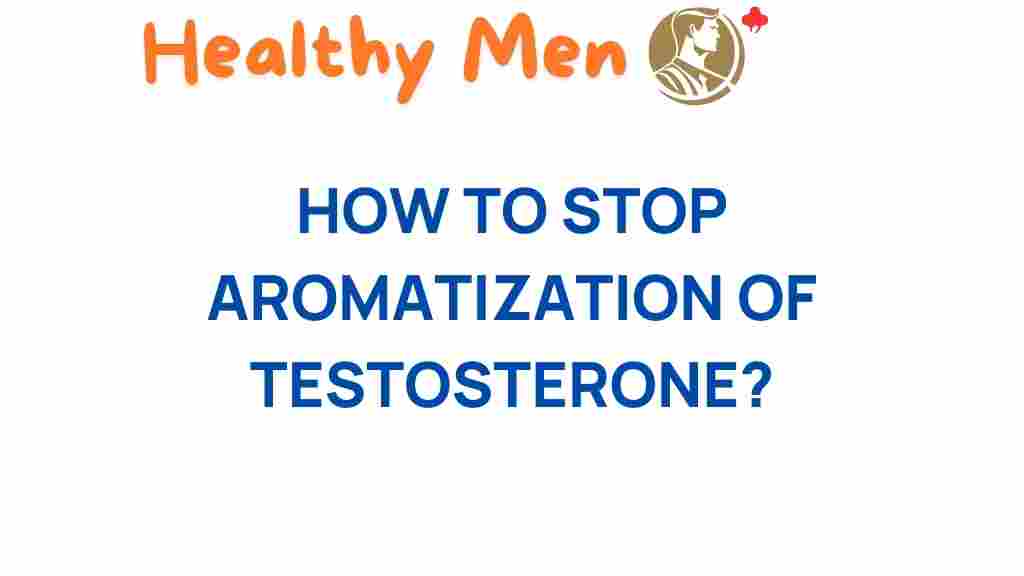Unraveling Aromatization: How to Stop Testosterone Conversion
Aromatization is a biological process that converts testosterone into estrogen, significantly impacting male health and hormone balance. Understanding aromatization is crucial for those looking to optimize their hormone levels, improve body composition, and maintain overall well-being. In this comprehensive guide, we will explore the mechanisms of aromatization, its effects on testosterone levels, and practical health tips to minimize unwanted estrogen production. Additionally, we will discuss natural remedies and strategies to help you achieve a healthy hormone balance.
What is Aromatization?
Aromatization is the enzymatic conversion of androgens, such as testosterone, into estrogens. This process occurs primarily in adipose (fat) tissue and is facilitated by the enzyme aromatase. While some level of estrogen is necessary for male health, excessive aromatization can lead to an imbalance, resulting in increased estrogen levels and decreased testosterone levels. This imbalance can manifest in various ways, including:
- Reduced libido
- Weight gain
- Fatigue
- Muscle loss
- Emotional changes such as irritability and depression
The Importance of Testosterone in Male Health
Testosterone is a vital hormone that plays a crucial role in numerous bodily functions, including:
- Regulating libido and sexual function
- Maintaining muscle mass and strength
- Supporting bone density
- Influencing mood and cognitive function
- Contributing to energy levels and overall vitality
Maintaining optimal testosterone levels is essential for male health, and managing aromatization effectively can help preserve these levels.
How Aromatization Affects Body Composition
Excessive aromatization can lead to increased estrogen levels, which can negatively impact body composition. Elevated estrogen levels in men can cause:
- Increased fat deposition, particularly in the abdominal area
- Decreased muscle mass
- Changes in fat distribution, leading to a more feminine physique
By strategically addressing aromatization, men can better manage their body composition and improve their overall health.
Step-by-Step Process to Stop Aromatization
Implementing a comprehensive approach to manage aromatization involves dietary, lifestyle, and natural remedy strategies. Here’s a step-by-step guide:
1. Optimize Your Diet
Your diet plays a crucial role in hormone balance. Consider the following dietary strategies:
- Increase Healthy Fats: Incorporate sources of healthy fats, such as avocados, nuts, and olive oil, which can support testosterone levels.
- Reduce Sugar Intake: High sugar consumption can lead to increased insulin levels and promote aromatization. Aim to limit sugary foods and drinks.
- Consume Cruciferous Vegetables: Vegetables like broccoli, cauliflower, and Brussels sprouts contain compounds that may help lower estrogen levels.
- Include Zinc-Rich Foods: Foods high in zinc, such as oysters, red meat, and pumpkin seeds, are essential for testosterone production.
2. Incorporate Exercise Regularly
Physical activity is vital for maintaining hormone balance and body composition. Focus on:
- Resistance Training: Engaging in weight lifting or resistance exercises helps build muscle and can boost testosterone levels.
- High-Intensity Interval Training (HIIT): Short bursts of intense exercise can improve hormone levels and aid fat loss.
- Aerobic Exercise: Regular cardiovascular workouts can help manage body fat, reducing the substrate available for aromatization.
3. Manage Stress Levels
Chronic stress can elevate cortisol levels, which may negatively impact testosterone levels and promote aromatization. Implement stress management techniques such as:
- Meditation and mindfulness practices
- Yoga and deep breathing exercises
- Regular physical activity
4. Consider Natural Remedies
There are several natural remedies that may help inhibit aromatization:
- Curcumin: Found in turmeric, curcumin has been shown to have anti-estrogenic properties.
- Resveratrol: This antioxidant, found in red wine and berries, may help lower estrogen levels.
- Green Tea Extract: Rich in catechins, green tea can potentially inhibit aromatase activity.
5. Ensure Adequate Sleep
Quality sleep is crucial for hormone regulation. Aim for 7-9 hours of restorative sleep each night to support your body’s natural hormone production.
Troubleshooting Tips for Managing Aromatization
If you’re struggling to manage aromatization despite following these steps, consider the following troubleshooting tips:
- Review Your Diet: Ensure you are consistently consuming a balanced diet rich in nutrients that support testosterone levels.
- Evaluate Your Exercise Routine: If you’re not seeing results, consider adjusting the intensity, frequency, or type of exercise you’re doing.
- Consult a Healthcare Professional: If lifestyle changes aren’t sufficient, it may be beneficial to seek professional advice. Hormonal imbalances can sometimes require medical intervention.
Conclusion
Aromatization can significantly impact testosterone levels, male health, and body composition. By understanding how aromatization works, men can take proactive steps to manage their hormone levels effectively. Implementing dietary changes, regular exercise, stress management, and natural remedies can help mitigate the effects of aromatization and promote a healthier hormone balance. Remember that individual responses may vary, and it’s essential to monitor your health and consult professionals when needed.
For more tips on optimizing your health and fitness, check out our fitness resources. Stay informed and empowered on your journey to better health!
For additional scientific insights on aromatization and its effects, visit this external resource.
This article is in the category Fitness and created by healthymen Team
